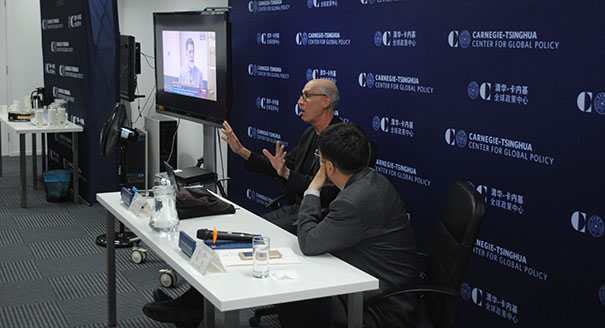Registration
You will receive an email confirming your registration.
On the campaign trail, candidate Donald Trump made repeated calls for the United States to remain a nuclear superpower. Since taking office, he has unveiled a budget that would increase U.S. military spending by $53 billion with $1.4 billion going toward expanding U.S. nuclear capabilities. While Trump has not clearly defined his nuclear ambitions, an expansion of the U.S. nuclear weapons arsenal could be seen by China as a move to contain the latter in the Asia-Pacific region. Overall, although the United States and China have established areas of cooperation in the nuclear and space realms, any adjustment on the part of the Trump administration could alter bilateral relations.
The Carnegie–Tsinghua Center’s Li Bin moderated a discussion with Gregory Kulacki from the Union for Concerned Scientists on the Trump administration's nuclear and space policy, how it is perceived in Beijing, and its likely impact on the future of U.S.-China relations.
This event was off the record.
Discussion Highlights
- A History of Nuclear Weapons: One panelist pointed out that the United States deployed low-yield nuclear weapons, also referred to as tactical nuclear weapons, in East Asia throughout the Cold War. Many of these weapons were deployed to the Japanese island of Okinawa and were kept in Asia primarily as a contingency plan in case war broke out with China, the panelist said.
- Post-Cold War Disarmament: Following the dissolution of the Soviet Union, former President George H. W. Bush initiated a process of unilateral disarmament and effectively reduced the size of the U.S. nuclear arsenal. These cuts were matched by Russia under Mikhail Gorbachev, leading to what one panelist described as the most significant moment in the history of nuclear disarmament.
- The Return of Pro-Nuclear Bureaucrats: A report released in 2009 by the Congressional Commission on the Strategic Posture of the United States marked a shift in nuclear deterrence thinking in the United States, as well as the return of tactical nuclear weapons to U.S. policy circles, a discussant argued. This shift was made possible, the discussant said, through cooperation between pro-nuclear American and Japanese bureaucrats that represented a dedicated, albeit small, faction of their respective political establishments. Coordination between these two groups is largely responsible for the creation of the U.S.-Japan Extended Deterrence Dialogue, which today provides a platform for both countries to discuss issues related to nuclear deterrence, according to a panelist.
- Trump’s Lack of Advisors: Panelists agreed that President Trump’s distrust of experts, and experts’ corresponding distrust of the president, poses a challenge to nuclear arms control and an opportunity for pro-nuclear policymakers. Furthermore, a panelist argued that Trump’s lack of policy experience, compounded with that distrust of experts, provides an opportunity for pro-nuclear officials and other radical members of the administration, such as Steve Bannon, to push through their personal policy preferences.
- Institutional Reliance: One discussant said that Trump’s reliance on intuition, rather than expert analysis, to guide his policy also makes him more susceptible to strong voices in the administration, with few moderating influences. The panelist emphasized that two elements are essential to successfully pushing policies through the government system: funding and silence. Right now, the panelist continued, pro-nuclear officials have both, which may lead to pro-nuclear policies, which could include the redeployment of tactical nuclear weapons in Asia in the near future.
Li Bin
Li Bin is a senior fellow working jointly in the Nuclear Policy Program and Asia Program at the Carnegie–Tsinghua Center for Global Policy and a professor of Tsinghua University.
Gregory Kulacki
Gregory Kulacki is the China project manager at the Union for Concerned Scientists. He has consulted Chinese and U.S. organizations, including the Senate Armed Services Committee and NASA.
